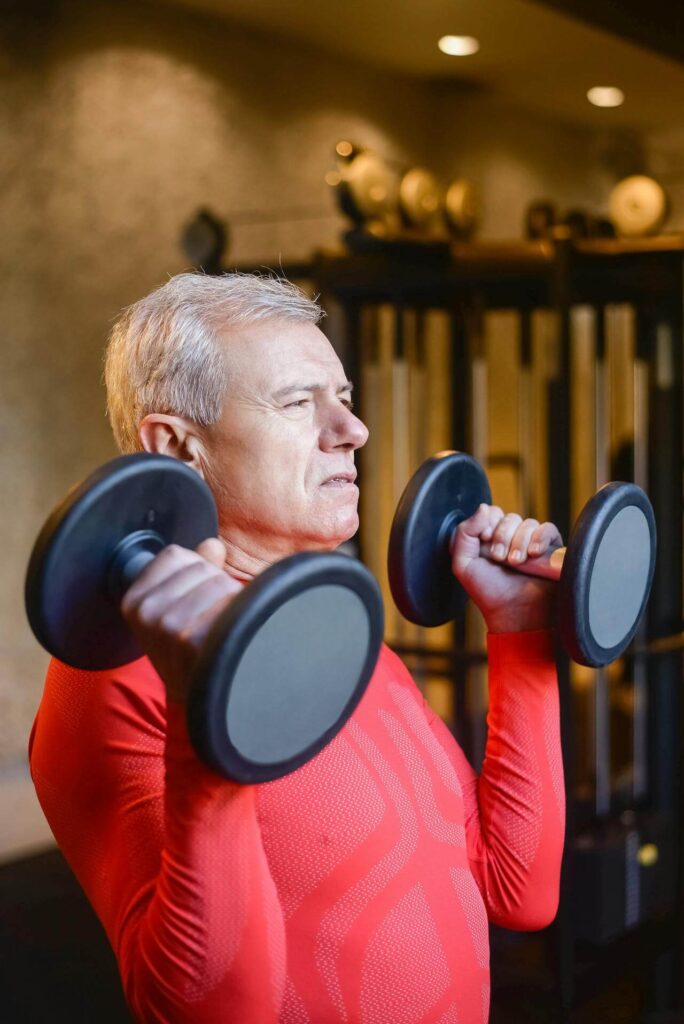Most people are familiar with menopause, the hormonal crash that hits women midlife. But far fewer talk about andropause, the age-related hormone shift that affects men. As men age, their testosterone slowly declines. This can trigger a host of symptoms like fatigue, low libido, mood swings, and poor sleep. These symptoms are often chalked up to stress, burnout, or just “part of getting older.” When really, low testosterone is to blame. Working with a functional medicine doctor in the Chicago area to get hormone testing can help you explore what’s truly behind these symptoms and guide a personalized plan forward.
In this article, we’ll walk you through what andropause is, why it flies under the radar, and natural ways to support testosterone.
What is Andropause?
Simply put, andropause is the gradual dip in testosterone that happens in midlife. It’s also known as late-onset hypogonadism, or “male menopause.” Yet the way it plays out is quite different from menopause.
Menopause is a sudden and dramatic change. Once ovulation ends, female sex hormones drop in a short amount of time. This can trigger intense symptoms that are hard to ignore, like hot flashes.
Hormones fall as men age, too, but at a much slower rate. On average, men’s testosterone levels drop about 1% per year between the ages of 40-70.1 Since it dips gradually, symptoms are often shrugged off—or ignored entirely.
The rate of decline varies from person to person. Stress, obesity, chronic illness, and certain medications can ramp up the decline.
There’s no surefire way to stop andropause in its tracks. After all, it’s a natural part of aging. However, shifting your diet and lifestyle can slow down the process and help you feel like yourself again.
Signs of Andropause

Since andropause sneaks up slowly, its symptoms often get overlooked. But they’re just as real.
After all, testosterone is a hormone that wears many hats. It plays a role in sex drive, bone density, fat metabolism, muscle mass, sperm production, and more.
So when testosterone levels get low, it can show up in unexpected ways, affecting physical and mental health.
Low testosterone symptoms include:2
- Chronic fatigue
- Decreased libido
- Erectile dysfunction
- Loss of morning erections
- Decreased muscle mass
- Increased body fat
- Loss of bone density
- Anxiety, worry, or nervousness
- Mood changes like irritability, anger, or depression
- Trouble sleeping
- Cognitive issues like memory problems
To be clear, not all men with low testosterone have symptoms. On top of that, many andropause symptoms overlap with other conditions.
For example, depression, adrenal fatigue, and thyroid imbalances can all cause fatigue. And stress, alcohol, and chronic conditions like diabetes can all contribute to low libido.
That’s why it’s important to take a holistic view and find all the root causes. A holistic doctor can help assess overlapping symptoms and uncover underlying hormonal imbalances that may be impacting your well-being.
How to Test for Andropause
If you’re dealing with andropause symptoms, hormone testing in Orland Park, IL can provide a clear, detailed picture of your testosterone and overall hormone health. At Anchored in Health, the DUTCH hormone test is our go-to assessment tool. Here’s why:
The DUTCH test measures:
- Testosterone
- Other sex hormones like estrogen and progesterone (yes, men make them too!)
- DHEA, a precursor to testosterone
- Cortisol and cortisol patterns
- Hormone metabolites
It also includes an organic acids test (OAT), which covers other imbalances that can interfere with your health and vitality. This includes metabolites for melatonin, B vitamins, and neurotransmitters, as well as oxidative stress and gut health markers.
This provides a more comprehensive look at your hormone health than checking testosterone alone.
The better you understand the root causes driving symptoms, the more effective your treatment can be.
How to Treat Andropause Naturally
While it’s normal for testosterone levels to dip as you get older, your lifestyle can either slow the decline or speed it up.
Here are some healthy habits that can increase your testosterone level naturally These strategies are often used in functional medicine to support hormone health and help men regain energy, focus, and confidence:
Eat a testosterone-friendly diet
Nutrition plays a huge role in hormone production, and testosterone is no exception. To be an effective hormone factory, you need to fuel your body well. That means limiting processed foods and sugar and eating a balanced diet that focuses on whole foods like fruits and veggies instead.

When meal planning, be sure to include testosterone-boosting foods like:
- Healthy fats: These act as building blocks for steroid hormones like testosterone. Avocados, olive oil, nuts, seeds, and fatty fish are all good sources of healthy fats.
- Foods high in zinc: Men who are low on zinc are often low on testosterone.3 Oysters, beef, shrimp, pork, turkey, pumpkin seeds, and lentils are all high in zinc.
- Omega-3 rich foods: Fish oil supplements, a rich source of omega-3 fatty acids, are shown to boost testosterone production.4 Prefer to get your omega-3s from food? Eat more salmon, tuna, mackerel, chia seeds, flaxseed, and walnuts.
Manage stress
Testosterone and cortisol (your main stress hormone) have an inverse relationship.5 Translation? When cortisol goes up, testosterone tends to go down. Excess cortisol can also lead to weight gain, especially in the belly area. Unfortunately, this can make matters worse. Belly fat contains the enzyme aromatase, which converts testosterone into estrogen.6
That’s why keeping stress in check is crucial for healthy testosterone production. Relaxation techniques like yoga, meditation, and deep breathing are excellent stressbusters. But sometimes the best antidote for stress is to make time for things you enjoy, whether that’s golf, hiking, or fishing.
Exercise regularly

Hitting the gym is one of the quickest ways to give your testosterone levels a lift. Research shows exercise increases testosterone production.7
Cardio and strength training can both help. Yet resistance training tends to have the edge when it comes to boosting testosterone. Moderate to high-intensity workouts seem to work the best.8 But try not to push it too hard. Overtraining can actually interfere with hormone production.9
Optimize sleep
Most testosterone is made while you sleep. Levels begin rising once you fall asleep and peak when you enter deep sleep (i.e., REM sleep).10 Levels stay high until you wake up.
That’s why testosterone levels can get thrown off if you skimp on sleep. Research shows that sleep restriction can lead to low T.11 To prevent this, make getting quality sleep a top priority.
To optimize sleep, create a sleep cave that’s dark, quiet, and cool. Head to bed at the same time every night and aim for 7-8 hours of Zzz’s. The better you sleep, the healthier your hormone levels will be.

Cut back on alcohol
If you want to raise your testosterone, you may want to reconsider raising that glass. Research shows heavy drinking is linked with lower testosterone levels.12
Alcohol harms Leydig cells in the testes that produce testosterone.13 But it also activates the aromatase enzyme, which converts testosterone into estrogen. So if you’re struggling with symptoms of low T, consider trimming your alcohol intake.
Avoid plastics
You may want to rethink your food storage. Plastics contain endocrine-disrupting chemicals (EDCs) like BPA and phthalates that can interfere with hormone balance.14
Storing food in plastic can cause these chemicals to leach into your food. Heating food in plastic is a major no-no, too.
To limit exposure to EDCs:
- Swap plastic food containers for glass
- Invest in a reusable stainless-steel water bottle
- Limit single-use plastic baggies in favor of eco-friendly options like silicone bags or beeswax wraps
Struggling with Low T Symptoms? Get Hormone Testing in Orland Park, IL & Get Answers
Low testosterone can leave you feeling exhausted and foggy, like you’ve lost your spark. But fatigue and low libido don’t always point to andropause alone. Adrenal fatigue and thyroid imbalances can look quite similar, and they often overlap.
That’s why targeted hormone testing is so important. The DUTCH test provides a full picture of your hormone health, so you can stop guessing and start a treatment plan that actually works with the support of a functional medicine doctor in the Chicago area.
The sooner you uncover what’s going on, the sooner you can get your energy and sex drive back on track. Ready to get started and live in the Chicago area?
- Contact us with questions.
- Schedule your DUTCH consultation at our Orland Park clinic here.
- Get a personalized plan to optimize your hormones so you can feel like yourself again!
Other Holistic Health Services Offered at Anchored in Health in Orland Park, IL
Anchored in Health provides a full spectrum of services to optimize your health. This includes chiropractic care, functional medicine, acupuncture, massage therapy, and the Shape ReClaimed program. We also offer thermography, genetic testing, and Vibrant Wellness testing to uncover what’s really going on beneath the surface.
Live in the greater Chicago area and want to learn more? Contact us to find out how we can help you feel your best.
Disclaimer: The information provided on this blog is for educational and informational purposes only and is not intended to diagnose, treat, cure, or prevent any disease. The content is not a substitute for professional medical advice, diagnosis, or treatment. Always seek the guidance of a qualified healthcare provider with any questions you may have regarding your health or a medical condition.
Reading this blog does not establish a doctor-patient relationship between you and Anchored in Health or any of its practitioners. Reliance on any information provided in this blog is solely at your own risk.
Sources:
- Andropause: Current concepts | PMC
- Male Andropause: A Myth or Reality | PMC
- Zinc status and serum testosterone levels of healthy adults | Pubmed
- Dietary supplementation with docosahexaenoic acid rich fish oil increases circulating levels of testosterone in overweight and obese men | Science Direct
- Relationship Between Circulating Cortisol and Testosterone: Influence of Physical Exercise | PMC
- Aromatase | Science Direct
- Endogenous transient doping: physical exercise acutely increases testosterone levels-results from a meta-analysis | Pubmed
- Various Factors May Modulate the Effect of Exercise on Testosterone Levels in Men | PMC
- Overtraining and the Endocrine System. Can Hormones Indicate Overtraining? | Society for Endocrinology
- Relationship between rapid eye movement sleep and testosterone secretion in normal men | Pubmed
- Effect of 1 Week of Sleep Restriction on Testosterone Levels in Young Healthy Men | PMC
- Alcohol’s Effects on Male Reproduction | PMC
- Substance Abuse and Male Hypogonadism | PMC
- Exposure to Endocrine Disrupting Chemicals and Male Reproductive Health | PMC
